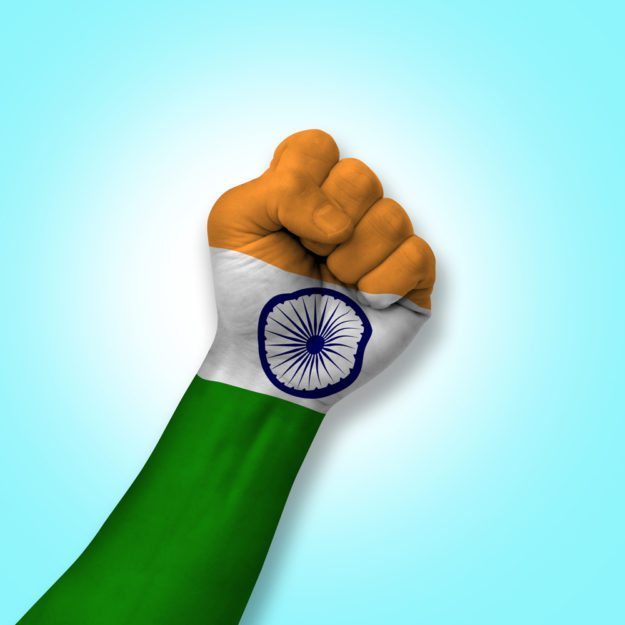Story Highlights
- The co-founders of Flipkart and Ola urged policymakers to protect them from their deep-pocketed foreign rivals
- In reality, globalisation and nationalism aren’t nearly as exclusive. In fact, the latter feeds off the former
- The true extent of our globalisation has always been pretty thin
The nationalisation banner raised by Sachin Bansal and Bhavish Aggarwal was always fluttering under a weak acceptance of globalisation in India
If we needed any more reason to declare 2016 the definitive annus horribilis for India’s startups, the outrage around Sachin Bansal and Bhavish Aggarwal’s “cry-baby nationalism” has surely done it.
Bansal and Aggarwal, the co-founders of Flipkart and Ola, respectively, urged policymakers to protect them from their deep-pocketed foreign rivals while speaking at a high-profile tech summit. The likes of Amazon and Uber, said Aggarwal, are dumping massive amounts of capital into the Indian market, thanks to their profitable operations elsewhere. This gives them an unfair advantage, since desi startups simply do not have access to so much easy money, went the argument.
More damningly, Aggarwal suggested that the foreign companies have no interest in innovating for India. Instead, they are winning over the market by throwing money at it. Their ultimate goal is to bleed the homegrown firms dry and establish monopolies. If this goes on unchecked, it would destroy our startup ecosystem. Hence, policymakers must step in and build fences around Indian startups.
In the Twitter era, what is more fascinating than things public figures say is the way people react to them. So, how did we react to Bansal and Aggarwal? By doing what we always do: organising ourselves into two warring camps.
There are those, like the author I have linked to above, who are outraged that India’s two most powerful entrepreneurs are trying to push the country back into the dark days of the licence raj.

Supporters of their stand say they have beaten impossible odds to build these companies ground up. Their opponents say Flipkart and Ola are heavily funded by foreign moneybags, and are therefore just as foreign as Amazon or Uber
Then there are those who think Bansal and Aggarwal have a perfectly legitimate case, and seek to back it up with data.
Supporters of their stand say they have beaten impossible odds to build their respective industries ground up in India. They are national jewels, and, therefore, deserve some sort of sanctuary. Others say they have every right to, and in fact they must, learn to safeguard their interests by lobbying the government, as companies in the West masterfully do.
But, their very vocal opponents rubbish these arguments. Flipkart and Ola are heavily funded by foreign moneybags, and are therefore just as foreign as Amazon or Uber. Hence, the nationalism defence is bunk. Critics don’t have any patience for the “innovation” claim either. Flipkart and Ola are themselves copies of Amazon and Uber. How can they take the moral high ground?
The missing nuance
At the moment, the outragers seem to have the upper hand. It’s an open and shut case of panicky losers hiding behind nationalism because they have seen the writing on the wall. Exposure to global competition is exactly what has helped India Inc. become a force to reckon with on the world stage. So any attempt to stymie it is actually anti-national, goes the argument. Long live globalisation.
Exposure to global competition is exactly what has helped India Inc. become a force to reckon with on the world stage. So any attempt to stymie it is actually anti-national, goes one argument
In principle, it is hard to fight this view. Personally, I too am a member of the free market camp. Surely, there is no place for musty old ideas like nationalism and protectionism in 2016, when globalisation is virtually irreversible? If you aren’t so sanguine and believe globalisation faces an uncertain future given the rise of ultra-nationalism the world over, isn’t that an even bigger reason to discredit any anti-globalisation pitch? How can there be any other way for humanity to move forward except throwing its might behind an open, flat, globalised world?
Except this line of argument, while being passionate, is way too simplistic and one-dimensional. It lacks context. The biggest problem with it is that the miracle of globalisation that is at the centre of it is based on a pretty big lie. A well-masked and seductive lie, but a lie nonetheless.
The world was never a seamless global village. And while throwing open the economy to the forces of globalisation remains one of India’s most cherished national memories, the fact is that we are pretty hopelessly closed off even today. This is a vital nuance, and valuable historical context, that can help us better understand the nationalism debate. But none of the analysts or commentators either for or against Flipkart and Ola have paid any attention to it.
I was first jolted into accepting that the world isn’t as globalised as it seems through the works of Pankaj Ghemawat, one of the most respected business academics in the world and an authority on globalisation. Ghemawat has a term for the song and dance around globalisation. He calls it “globaloney”.
The true extent of our globalisation has always been pretty thin, even though gung ho headlines may have convinced some of us that globalisation was an unstoppable juggernaut and nationalism was an irrelevant, dying force
“Indians, and especially Indian executives, display great enthusiasm for the opportunities afforded by globalisation,” Ghemawat wrote back in 2012 in a magazine article (paywall) I had commissioned. He pointed out that in a Pew survey, 82% of Indians felt that “trade and business ties” are either very good or somewhat good for India.
But that sentiment was completely divorced from facts. As Ghemawat went on to demonstrate, India remains one of the world’s least integrated economies.
To be sure, globalisation everywhere is stronger in people’s imagination than in reality. In a note accompanying the 2016 DHL Global Connectedness Index, which Ghemawat has designed with Steven A Altman, the duo write: “The data covered in this report depict a world in which the flows that cross borders are much too large to ignore but still far smaller than many people think — and concentrated among countries that are geographically close or share other similarities with each other.”
Even in this generally unconnected world, India’s connectedness rank (measured by cross-border flows of trade, capital, information, and people) is abysmal: #78 out of 140 countries. That’s poorer than Cambodia and Congo. In fact, notwithstanding the hype around a Silicon Valley-inspired startup boom, a muscular consumer internet market, a foreign policy push predicated on open trade, reverse brain drain, and a much tom-tommed improvement in the ease of doing business, this is India’s worst performance on the list since 2005 after a period of ascendancy. In contrast, over the same period, the world as a whole became more connected (8% more to be precise).
What explains the chasm between the perception of globalisation and the reality? “India’s gains in global connectedness since 2005 were driven principally by India’s fast growing outward foreign direct investment (FDI), exemplified by the headline-grabbing overseas acquisitions made by India’s corporate leaders,” Ghemawat wrote in his 2012 article. “But those big deals abroad mask the fact that India’s inward FDI stock as a percentage of its GDP still figures in the bottom 10% of countries. More generally, India’s outward connectedness exceeds its inward connectedness by a wide margin.”
That’s the truth about India and globalisation. The true extent of our globalisation has always been pretty thin, even though gung ho headlines may have convinced some of us that globalisation was an unstoppable juggernaut and nationalism was an irrelevant, dying force.
Being global feeds nationalism
Shouldn’t the low penetration of globalisation, if anything, push India to open up more its borders, assuming one believes the narrative that borderless competition is, in general, good? In reality, globalisation and nationalism aren’t nearly as exclusive. In fact, the latter feeds off the former. While the big bang foreign acquisitions by the Tatas, Aditya Birla, Bharti Airtel, ONGC, etc cemented the globalisation narrative, it didn’t wipe out nationalism. It did exactly the opposite: kindled an unprecedented wave of nationalist pride in Indian businesses.

The timing of these splashy acquisitions is of particular significance. Most of them came between 2006 and 2010. Probably the most famous of them was Tata Motors’ $2.3 billion buyout of the Jaguar and Land Rover brands in 2008. Crucially, those were exactly the years when the world was reeling under the worst recession in decades.
But in India, we barely flinched. Pundits the world over hailed India as the saviour of the world. A strong, relatively insulated domestic economy and widely acclaimed domestic financial institutions, which only added to the surge of heady nationalist pride.
Bansal and Aggarwal’s narrative is squarely the product of this nationalist pride. It was in a climate of “the world needs us more than we need it” bravado that Flipkart (2007) and Ola (2010) were born. Our bellwether companies had planted the Indian flag all over the world, and our economy had shouldered the world’s burden. The only thing missing was a bunch of intrepid entrepreneurs who could push this legacy forward. Flipkart and Ola and other startups that followed became vehicles for that.
Let’s not forget, a large section of the media, who now denounce Bansal’s and Aggarwal’s protectionist calls, played a massive role in whipping up the nationalistic frenzy around startups. By now, it is a well-worn criticism that the media failed to ask relevant questions of fledgling startups, busying itself with meaningless fundraising numbers instead. A journalist who was part of The Economic Times newsroom in the early days of the startup craze told me on condition of anonymity: “There was almost a patriotic fervour associated with this beat. We felt like we had to give these guys a leg up.”Globalisation and nationalism fused together as the startup story became bigger.
The nationalism-globalisation fusion reached its crescendo in January this year, when the Prime Minister presided over the grand Startup India spectacle in Delhi, with the country’s finest entrepreneurs sharing the limelight with the world’s biggest. In Narendra Modi’s India, world-class startups were to be at the forefront of a national renewal — no matter that almost all of them were funded by overseas capital. “Yes, we knew a lot of it was spin,” a Bengaluru-based entrepreneur running a leading consumer tech company told me off the record. “But the thing about entrepreneurs is, we will ride any spin so long as it helps business.”
The future
Given all this, it shouldn’t really shock us when someone invokes nationalism and rubbishes globalisation. Nationalism isn’t some underground counterculture that has made a deceptive comeback through two desperate entrepreneurs. It was always there, booming, right before our eyes. And as Ghemawat’s stats show, we are actually far less globalised than we were five years ago. Unfettered globalisation, on which Bansal and Aggarwal’s critics seem to predicate their objections, is at best an urban myth, though that’s the subject of a whole different essay.

So far, most of the funding into Indian startups has been concentrated in consumer internet companies serving a small fraction of the country’s population
For an even deeper understanding of the backstory to the Bansal-Aggarwal outburst, look to the future. The urban-rural market dynamic is, I believe, an important driver of Flipkart and Ola’s protectionist appeal. So far, most of the funding into Indian startups has been concentrated in consumer internet companies serving a small fraction of the country’s population, predominantly living in its cities. While incursions have been made into Tier II and Tier III towns, the real battle for the middle and bottom of the pyramid in suburban and rural India hasn’t yet begun in earnest. With the government’s push to a digital economy and the beginnings of a 4G revolution, that battle is now upon us — one from which there is no turning back.
Given the nature of the consumer internet, it is anybody’s guess how the battle will play out. But one thing is for sure: this will be a long, expensive battle to the death with one, at most two, players standing in each business. Whoever has the bigger war chest and more stamina will likely win. Consider Bansal and Aggarwal’s plea to the government as a final cry for bloodless arbitration.
Subscribe to FactorDaily
Our daily brief keeps thousands of readers ahead of the curve. More signals, less noise.
To get more stories like this on email, click here and subscribe to our daily brief.
Disclosure: FactorDaily is owned by SourceCode Media, which counts Accel Partners, Blume Ventures and Vijay Shekhar Sharma among its investors. Accel Partners is an early investor in Flipkart. Vijay Shekhar Sharma is the founder of Paytm. None of FactorDaily’s investors have any influence on its reporting about India’s technology and startup ecosystem.








